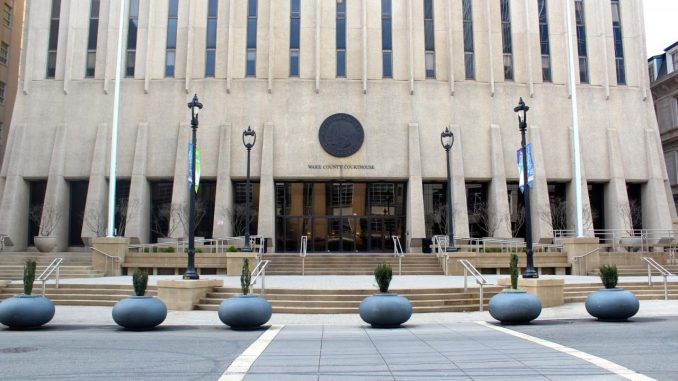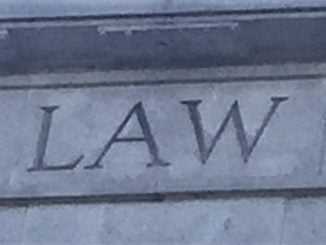
RALEIGH — The lawyer who represented former NC-09 congressional candidate Dan McCready over the much-publicized absentee ballot harvesting case in Bladen County has filed a suit to overturn a law put in place to curb absentee ballot fraud.
The organization “Democracy Docket” filed the suit the day after Super Tuesday, on March 4. Democracy Docket is an organization founded by Marc Elias, an attorney with Perkins Coie, a Washington D.C.-based law firm. Elias was also the lawyer for the 2016 Hillary Clinton presidential campaign and represented N.C. Gov. Roy Cooper during the 2016 gubernatorial election recount.
“These reforms were put into place to protect North Carolinians’ right to vote,” the bill’s sponsor, Sen. Warren Daniel (R-Burke), said in a statement. “This is just another lawsuit in a long string of left-wing attempts to influence election outcomes. These were common-sense changes passed to put an end to organized groups taking advantage of voters for partisan gain.”
Daniel continued, saying, “It shouldn’t be controversial to want to quash election fraud, but far-left lawyers in D.C. continue to show that they’re more concerned about winning elections than protecting the right to vote, even if it means throwing North Carolina’s Democratic legislators under the bus.”
In March of 2019, former State Board of Elections executive director Kim Strach had asked lawmakers to come up with a more secure absentee ballot process. The result was Senate Bill 683, which is the main target of the suit.
Senate Bill 683 was signed into law by Cooper last year. The measure had passed the state Senate unanimously and was passed by the house by a vote of 111-1. The lone “no” vote belonged to Rep. Darren Jackson of Wake County, the Democratic House minority leader.
The law cuts out any outside third-party assistance for requesting mail-in absentee ballots and requires the ballot be completed entirely by the requestor or with the aid of a near relative or guardian. Outside help can only be sought if a voter is disabled or illiterate and no near relative/guardian is available to assist.
To deter absentee ballot mills like the one identified in Bladen County, the law also enacted harsher penalties and created new criminal penalties for selling completed request forms or completed ballots. New penalties were added for intentionally failing to deliver mail-in requests or ballots, copying or retaining identifying information from an application for a ballot, and for receiving payment based on a number of returned requests.
In addition, the list of voters who request a mail-in absentee ballot is kept confidential until the polls open on election day.
The suit brought by Elias and Democracy Docket focuses on what the suit describes as the disallowance of third parties from assisting in absentee ballot activities as an “Application Organizing Ban.” The complaint says such a ban “severely burdens protected political speech and associational rights” and “unnecessarily burdens North Carolinians’ right to vote.”
The complaint also alleges that the law is not “appropriately tailored” to prevent fraud. Despite Elias’ own involvement in the Bladen County absentee ballot harvesting case, his organization’s complaint asserts that the pre-existing law covering absentee ballots is enough to deter fraud.
The new law, according to the complaint, “restricts the constitutionally protected activities of GOTV organizations that assist voters in completing and submitting absentee ballot applications as a means to encourage political participation and increase turnout,” and also “burdens voters who require assistance to obtain an absentee ballot.”
Elias’ “Democracy Docket” filed the suit on behalf of a 501(c)4 dark money group called “Advance North Carolina.”
According to its website, Advance North Carolina “is a statewide, independent, Black-Led, 501c (4) organization with a mission to build political and economic power in Black communities and institutions in North Carolina.”
Board members include Courtney Crowder, the chair of Crowder Consulting Company, who also served four years as legislative director and senior advisor to former Democratic Gov. Beverly Perdue. Crowder was also a campaign and congressional staffer for Congressman Bob Etheridge from 2000 to 2003.
Another board member is Erin Byrd, who Advance Carolina’s website lists as the treasurer for the group and a member of the Partnership Fund and Partnership Action Fund. The bio doesn’t mention Byrd was previously the executive director for the non-profit Blueprint NC.
In 2015, a Blueprint NC memo was leaked to the press outlining to its coalition of over 40 progressive and left-leaning organizations how to “slam, cripple and eviscerate” any elected Republican official.
Other members of the Advance North Carolina board include Sonia Barnes, district liaison for Congressman David Price; Viola Harris, a commissioner in Edgecombe County; Conen Morgan of Longleaf Agency LLC; and Moses Matthews of Entity Enterprises LLC.
At the helm of Advance North Carolina as its executive director is Marcus Bass. He previously worked for the left-leaning nonprofit Democracy NC and is a current board member of Common Cause NC. Like Bryd, Bass was also involved with Blueprint NC and served as a board member during the same time period as Anita Earls, the newest North Carolina Supreme Court associate justice.
Advance North Carolina’s most recent available tax filings are from 2017. The tax filings show total revenue of $165,990 but with expenses totaling $227,153. The prior year’s filings list revenue of $536,851 and expenses of $437,321.
Noteworthy donations to the group include $100,000 in 2016 from the Sixteen Thirty Fund, a charity pass-through organization that anonymizes donor money through the issuance of grants, in effect masking the original source of grant monies.
George Soros’ Tides Foundation also gave the group $10,000 in 2016 and $11,000 in 2018.


